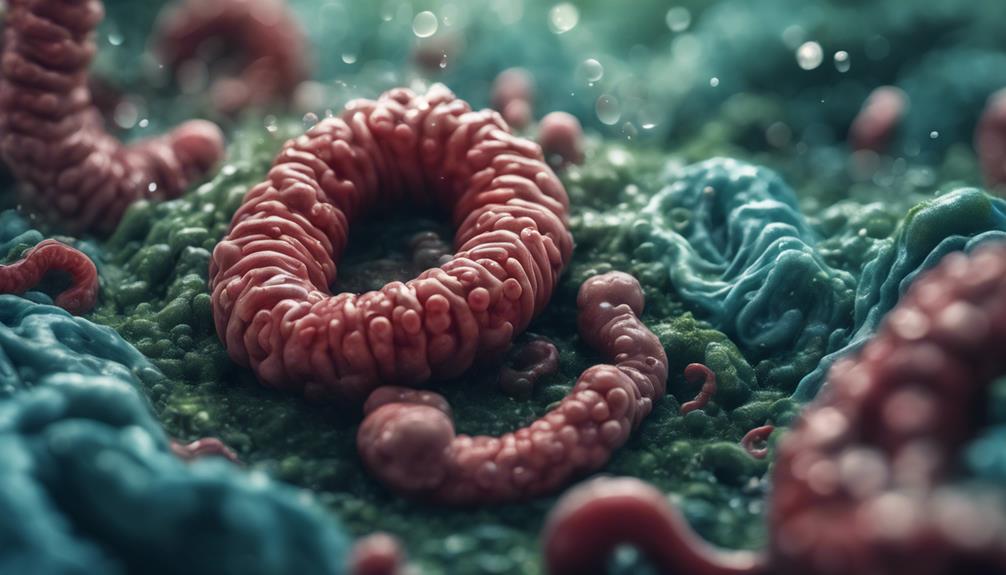You may be experiencing gut rot if you're plagued by persistent stomach pains, bloating, and digestive issues, as these symptoms often signal an underlying imbalance in your gut microbiome. Gut rot can be caused by factors like processed foods, stress, and antibiotics, leading to symptoms like bloating, nausea, and digestive issues. Addressing the pivotal root cause is essential for symptom relief and healing. As you continue to explore the complexities of digestive distress, you'll uncover the importance of maintaining gut health and microbiome balance to alleviate gut rot and promote overall well-being.
Key Takeaways
- Gut rot refers to stomach pains or upset stomach caused by various factors weakening the gut lining, leading to symptoms like bloating and nausea.
- An imbalance of gut bacteria, dietary toxins, stress, and antibiotics can contribute to gut rot and digestive distress.
- Gut rot is often a sign of underlying issues such as food allergies or chronic disorders, and addressing the root cause is crucial for symptom relief and healing.
- Poor digestion, inadequate digestive enzymes, and stomach acid imbalance can also trigger gut rot and digestive issues.
- Maintaining a healthy gut microbiome through a balanced diet, probiotics, and stress management techniques can help prevent gut rot episodes and promote overall digestive health.
Defining Gut Rot and Its Impact
You've probably experienced gut rot at some point, whether it was after a night of heavy drinking or a large, rich meal. The term 'gut rot' is often used to describe the stomach pains or upset stomach that can occur in such situations.
However, gut rot can be caused by a variety of factors, not just excessive indulgence. When your stomach is upset, it can weaken the gut lining, leading to abdominal pain and discomfort. This can also cause digestive issues, such as bloating, nausea, and changes in bowel habits.
Gut rot can be a sign of an underlying issue, such as a food allergy or chronic digestive disorder. It's essential to address the underlying cause of gut rot to alleviate symptoms and promote healing.
Common Causes of Digestive Distress
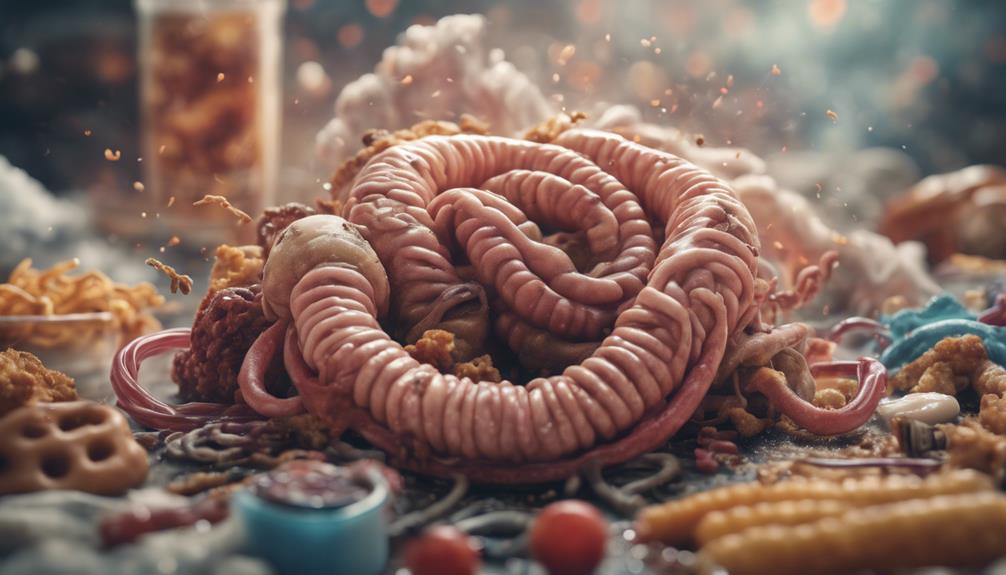
As you explore the common causes of digestive distress, you'll discover that an imbalance of gut bacteria, exposure to dietary toxins, and stress and anxiety can all contribute to gut rot.
These factors can disrupt the delicate balance of your gut microbiome, leading to a range of uncomfortable and even debilitating symptoms.
Poor Gut Bacteria
One of the primary contributors to digestive distress, including gut rot, is an imbalance of gut bacteria, also known as dysbiosis.
You may be wondering what causes this imbalance. Factors such as a diet high in processed foods, stress, antibiotics, and alcohol can disrupt the gut microbiome, leading to poor gut bacteria.
As a result, you may experience symptoms like bloating, gas, abdominal pain, and irregular bowel movements.
If you're experiencing these symptoms, addressing the underlying factors contributing to dysbiosis is vital. Restoring gut bacteria balance through probiotics and fiber-rich foods can help alleviate digestive discomfort.
By incorporating these elements into your diet, you can improve your gut health and reduce digestive distress.
Dietary Toxin Exposure
Dietary toxins, lurking in seemingly harmless foods, can silently wreak havoc on your gut health, paving the way for digestive distress and gut rot. Consuming processed foods, laden with artificial sweeteners, preservatives, and trans fats, can disrupt your gut microbiota, leading to inflammation and digestive discomfort. These toxins can also increase gut permeability, allowing harmful substances to leak into your bloodstream, exacerbating gut-related issues.
High consumption of these toxic substances can lead to chronic digestive health problems, including gut rot. Conversely, opting for whole, unprocessed foods can greatly reduce your exposure to dietary toxins, promoting a healthy gut microbiota and overall digestive health.
Stress and Anxiety
You're probably aware that stress and anxiety can wreak havoc on your entire body, but did you know that they can also seriously disrupt your digestive system, leading to a range of uncomfortable symptoms? This is because stress and anxiety can trigger the gut-brain connection, disrupting normal digestive processes.
When you're stressed or anxious, your body releases stress hormones like cortisol, which can affect gut motility, leading to symptoms like bloating, diarrhea, or constipation. Additionally, anxiety can cause the release of stress chemicals that impact gut function, potentially exacerbating conditions like IBS or gastritis.
Chronic stress can also weaken the immune system in the gut, making you more susceptible to digestive issues.
Some key things to keep in mind:
- Stress and anxiety can disrupt the gut-brain connection, leading to digestive distress
- Cortisol can affect gut motility, leading to uncomfortable symptoms
- Anxiety can exacerbate conditions like IBS or gastritis
- Chronic stress can weaken the immune system in the gut, making you more susceptible to digestive issues
The Role of Poor Digestion
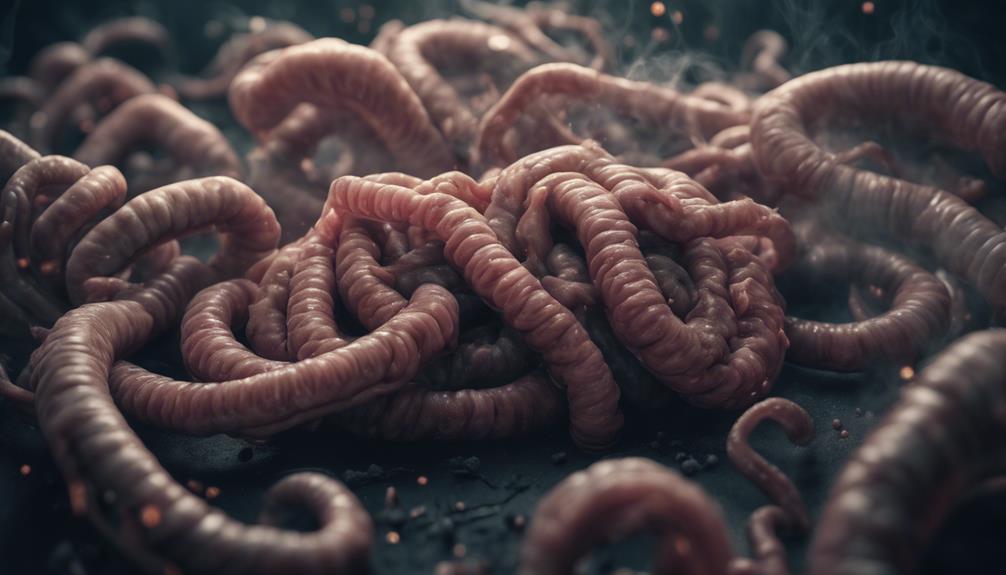
When your digestive system struggles to break down food properly, it can lead to a host of uncomfortable symptoms, including bloating, gas, and stomach pain, all of which are commonly associated with gut rot.
Poor digestion can be triggered by factors such as overeating, food intolerances, and chronic digestive disorders. If you're not producing enough digestive enzymes or have a stomach acid imbalance, it can hamper proper digestion, leading to gut rot symptoms.
Additionally, stress and a lack of fiber in your diet can also impact digestion, exacerbating gut rot issues.
By addressing poor digestion through dietary changes, stress management, and digestive enzyme supplementation, you can alleviate gut rot symptoms. It's essential to recognize the role of poor digestion in gut rot and take proactive steps to address it.
Gut Health and Microbiome Balance
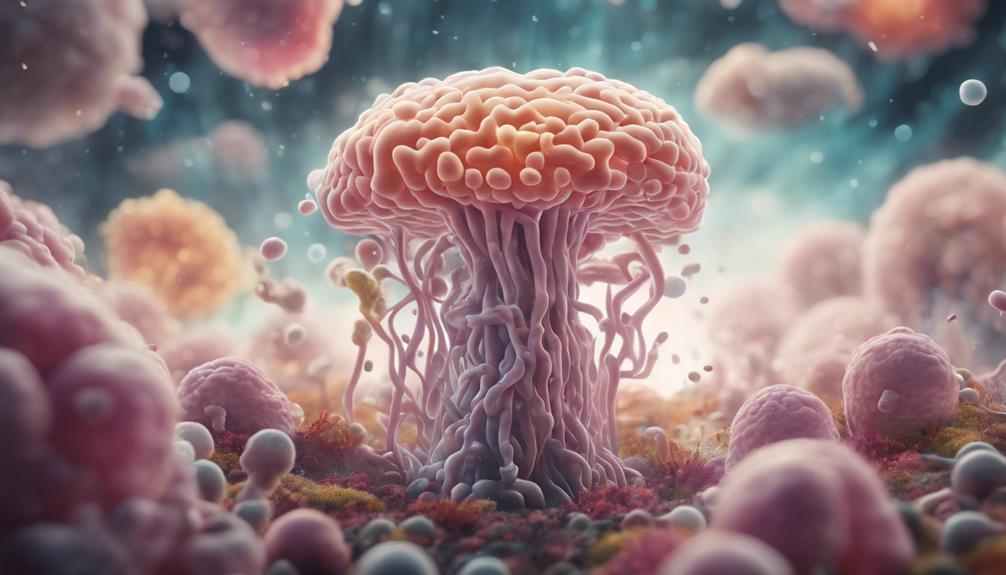
Alcohol consumption can wreak havoc on your gut health, disrupting the delicate balance of your microbiome and paving the way for digestive distress, including gut rot. When you drink excessively, you're not only damaging your liver, but you're also altering the balance of your gut bacteria, leading to digestive issues.
Maintaining a healthy gut microbiome is vital for overall digestive health and well-being.
To promote digestive health, it's important to:
- Avoid excessive alcohol consumption to prevent gut dysbiosis
- Incorporate probiotic-rich foods into your diet to restore and maintain a healthy balance of gut bacteria
- Focus on promoting digestive health through a balanced diet and healthy lifestyle choices
- Be aware of the signs of gut rot, including bloating, abdominal pain, and diarrhea, and seek medical attention if you experience persistent symptoms
Understanding Leaky Gut Syndrome
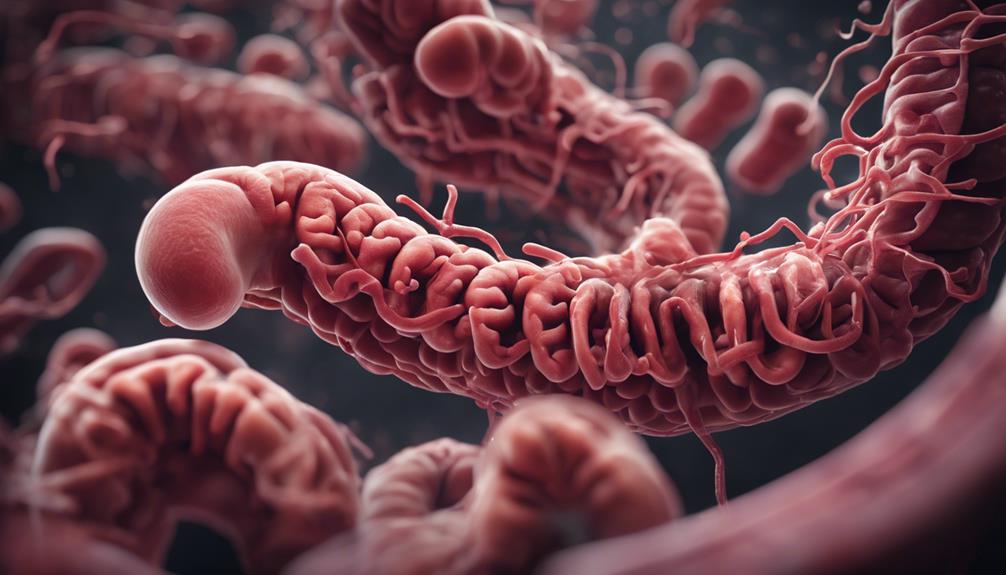
Your gut lining is your body's first line of defense against toxins and pathogens, but in Leaky Gut Syndrome, this protective barrier becomes compromised, allowing harmful substances to seep into your bloodstream.
This condition, characterized by increased intestinal permeability, allows toxins, undigested food particles, and other harmful substances to pass through the weakened gut lining and into your bloodstream, triggering an immune response.
According to Dr. Alessio Fasano, both environmental factors and genetic predispositions contribute to the development of Leaky Gut Syndrome.
Symptoms may include bloating, food sensitivities, fatigue, and chronic inflammation.
Factors like diet, stress, and genetics can weaken the gut lining, leading to Leaky Gut Syndrome.
Understanding the causes and symptoms of Leaky Gut Syndrome is essential in taking the first step towards restoring gut health through dietary changes and lifestyle modifications.
Restoring Gut Health Naturally

As you begin the journey to restore your gut health, it's crucial to focus on three key areas: consuming gut-friendly foods, managing stress effectively, and incorporating probiotics and prebiotics into your daily routine.
By making these changes, you'll be well on your way to healing your gut and alleviating digestive distress.
Eat Gut-Friendly Foods
By incorporating gut-friendly foods into your diet, you can take the first step towards restoring your gut health naturally. A well-balanced diet rich in fiber, fruits, and vegetables, as well as whole grains, can help promote a healthy balance of gut bacteria.
To support your gut health, consider incorporating the following foods into your diet:
- Probiotic-rich foods like yogurt, kefir, and sauerkraut to promote a healthy balance of gut bacteria
- Prebiotic-rich foods like bananas, onions, and garlic to support the growth of beneficial bacteria in the gut
- Fiber-rich foods like fruits, vegetables, and whole grains to help regulate digestion and prevent digestive distress
- A diverse range of nutrient-rich foods to support overall gut health and reduce digestive distress
Manage Stress Effectively
To reduce the negative impact of stress on your gut health, you need to learn effective stress management techniques. Chronic stress can lead to gut issues like inflammation, imbalance in gut bacteria, and compromised gut barrier function. Fortunately, practices like meditation and deep breathing can help mitigate these effects.
| Stress Management Techniques | Benefits for Gut Health |
|---|---|
| Meditation | Reduces inflammation, promotes balance in gut bacteria |
| Deep Breathing | Relaxes gut muscles, improves gut barrier function |
| Yoga | Lowers stress levels, promotes overall gut health |
| Quality Sleep | Helps regulate gut bacteria, reduces inflammation |
| Regular Exercise | Reduces stress, promotes gut healing |
Probiotics and Prebiotics
You can start restoring your gut health naturally by incorporating probiotics and prebiotics into your diet. Probiotics are live beneficial bacteria that help restore gut flora balance and support digestion, while prebiotics are non-digestible fibers that nourish the good bacteria in the gut, promoting their growth and function.
Research shows that combining probiotics and prebiotics can improve gastrointestinal symptoms like bloating, gas, and constipation.
Here are some key points to consider:
- Probiotics can be found in fermented foods like yogurt, kefir, and sauerkraut, while prebiotics are present in foods like bananas, onions, and garlic.
- Combining probiotics and prebiotics can enhance gut health, reduce inflammation, and strengthen the gut barrier.
- A healthy gut microbiome is essential for proper digestion and overall well-being.
- By incorporating probiotics and prebiotics into your diet, you can take a significant step towards restoring your gut health naturally.
Preventing Future Gut Rot Episodes

Fortunately, making a few simple lifestyle changes can greatly reduce the likelihood of future gut rot episodes. By incorporating healthy habits into your daily routine, you can prevent abdominal pain, promote gut health, and reduce constipation.
Here are some key takeaways to get you started:
| Lifestyle Change | Benefits | Tips |
|---|---|---|
| Limiting alcohol consumption | Reduces stomach inflammation | Set a daily limit and avoid binge drinking |
| Eating fiber-rich foods | Supports digestive health | Incorporate fruits, vegetables, and whole grains into your diet |
| Taking probiotics | Promotes a healthy gut microbiome | Consume probiotic-rich foods like yogurt and kefir |
Additionally, staying hydrated throughout the day can help maintain optimal gut function and prevent constipation. Managing stress levels through techniques like meditation or exercise can also help prevent gut issues and potential episodes of gut rot. By making these simple changes, you can take control of your gut health and reduce the risk of future gut rot episodes.
Frequently Asked Questions
What Does a Rot Gut Feel Like?
You feel a gut-wrenching discomfort, like a heavy, bloated sensation in your stomach, accompanied by sharp pangs of pain, nausea, and a general feeling of unease that makes you want to curl up and wait for it to pass.
How to Get Rid of Rot Gut?
Imagine waking up feeling revitalized, not weighed down by gut rot. To get rid of it, you'll rest, hydrate, ditch the booze and processed foods, and try ginger, peppermint, or probiotics to soothe and rebalance your gut.
What Does a Damaged Gut Feel Like?
You might experience persistent stomach pain, discomfort, and bloating, accompanied by irregular bowel movements, nausea, vomiting, and indigestion, making you feel miserable and affecting your daily life.
Can Food Rot in Your Gut?
Imagine leaving a ripe banana on your counter for weeks – it'll turn into a mushy, smelly disaster. But, surprisingly, that won't happen in your gut. You can't "rot" food in your stomach or intestines, thanks to the acidic environment and digestive enzymes that break it down efficiently.
Does Eating Chinese Cuisine Like Subgum Wontons Lead to Digestive Distress such as Gut Rot?
Savoring subgum wontons from Chinese cuisine can sometimes lead to digestive distress, such as gut rot, for those with sensitive stomachs. It’s important to listen to your body and not overindulge in rich or greasy foods. Moderation is key to enjoying these delicious dishes without experiencing discomfort.
Conclusion
As you navigate the complex landscape of digestive health, remember that your gut is like a delicate garden, requiring careful tending to flourish.
By understanding the causes of gut rot and taking proactive steps to restore balance, you can cultivate a thriving microbiome and reap the rewards of peak digestion.
By making informed choices, you can break free from the cycle of digestive distress and sow the seeds of long-term gut health.

